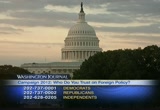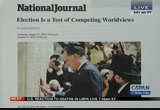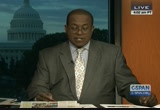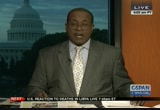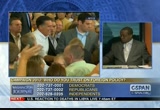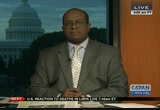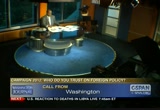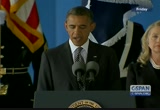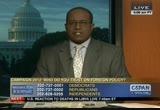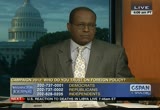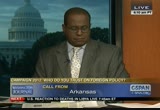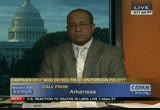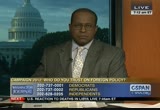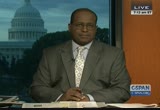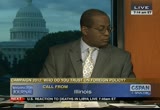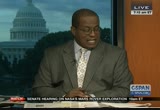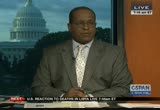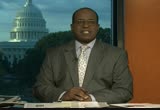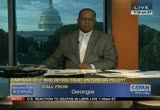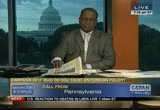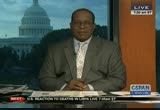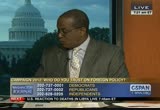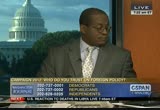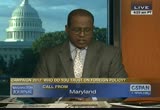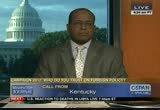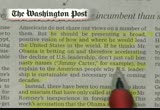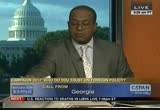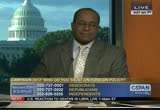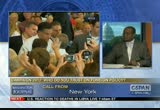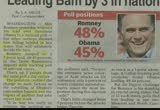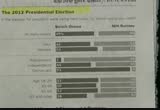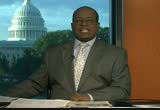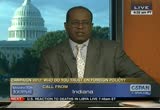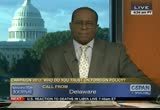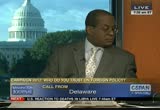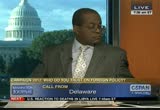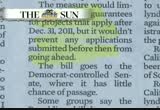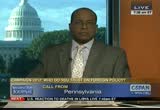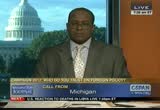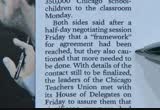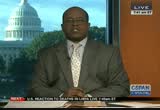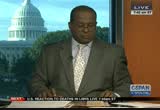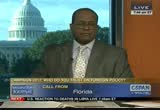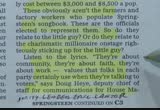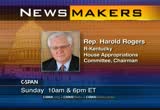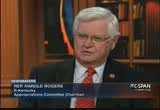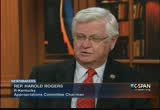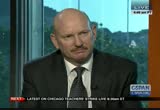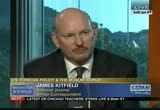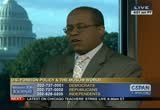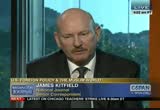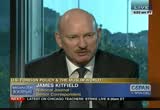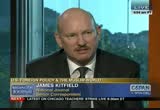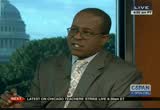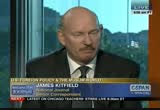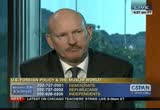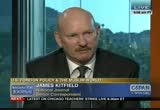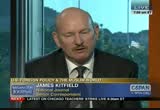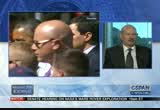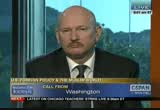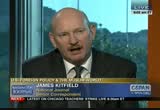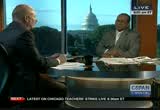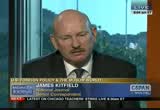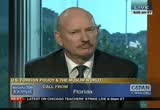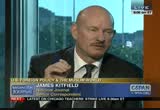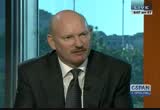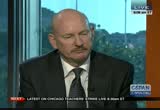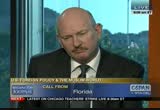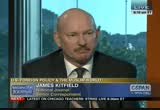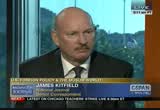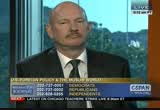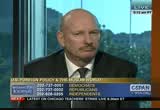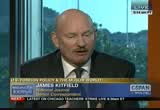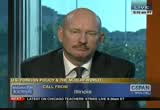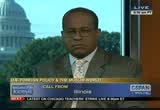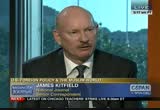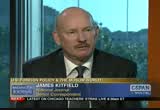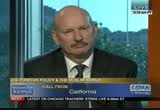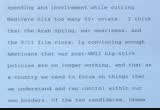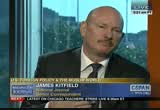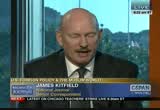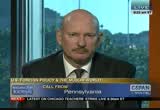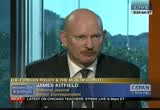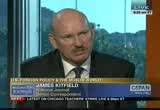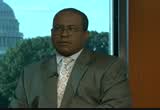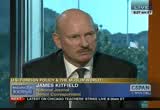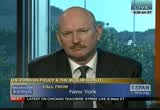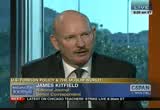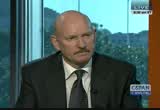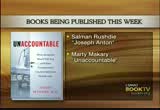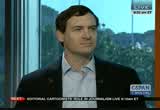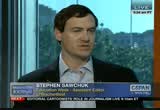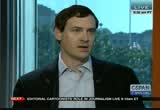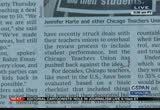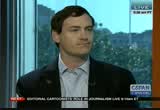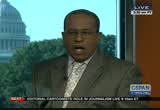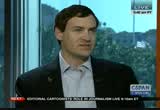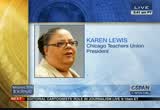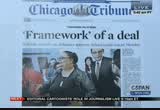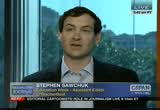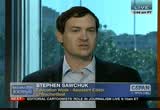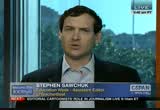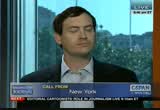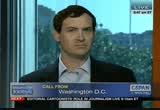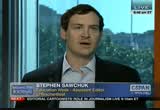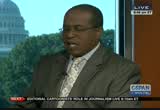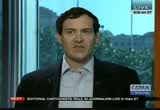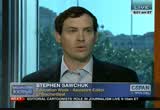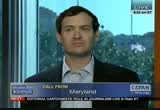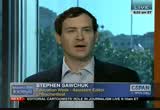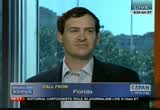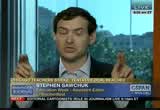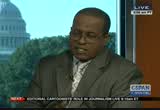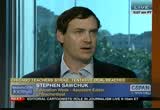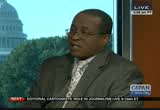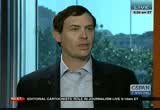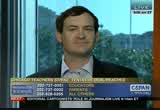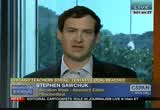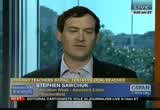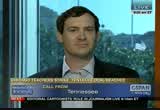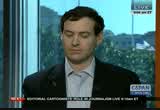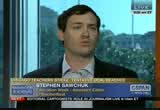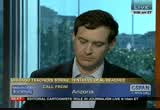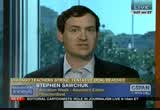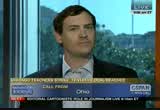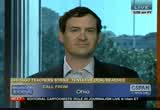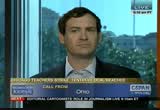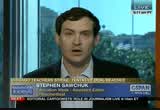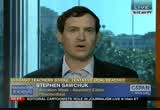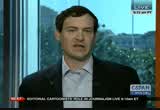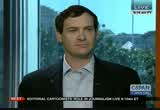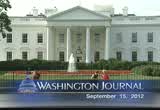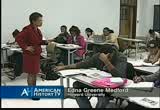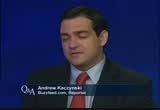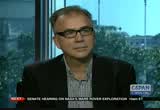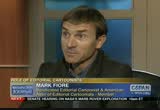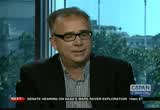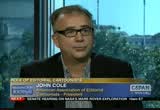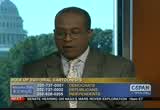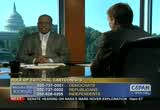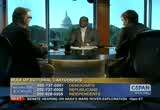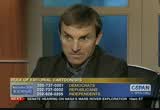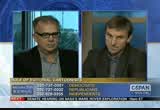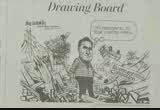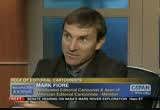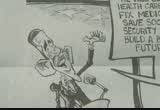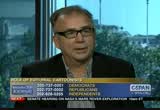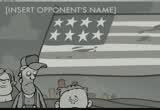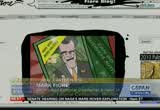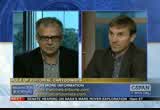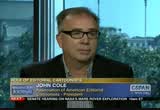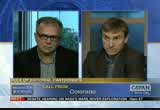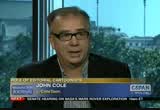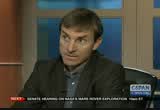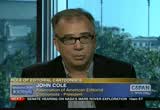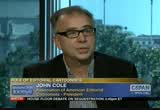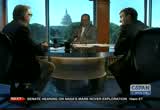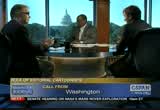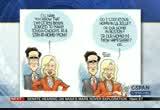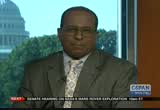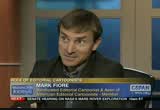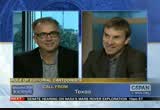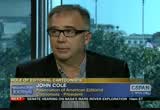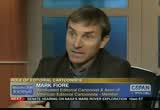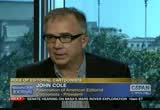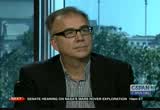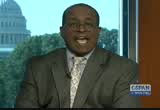tv Washington Journal CSPAN September 15, 2012 7:00am-10:00am EDT
7:00 am
americans in libya. and the latest information about the chicago teachers strike. later, the president of the american association of editorial cartoonists talks about his role in an impact on journalism. "washington journal ♪ ♪ >> in the headlines this morning -- moslem. at u.s. spreads -- anti- american express be on the middle east. good morning and welcome to this addition of "washington journal " today is saturday, september 15. we thought we would talk for the first 45 minutes about who you trust on foreign policy. the
7:01 am
discussion has become part of the political dialogue going on between governor romney and president obama. we want to get your thoughts on that this morning. who do you trust on foreign policy in campaign 2012. the numbers are on your screen. you can get in touch with us via social media -- host: we will take a look at an article by james kitfield in "the national journal." he will be our guest later in the airport. the election is a test of
7:02 am
7:04 am
conflict regarding different areas around the globe but let's go to the phones. our first call regarding campaign 2012 -- who do you trust on foreign policy? our first call comes from south carolina, good morning. caller: thanks for taking my call. i trust president obama. mitt romney wants to go to war again with by ren and we don't need another war. -- with iran and we don't need another war. obama has done everything he can as president. we had a national tragedy and he wants to politicize it. i don't trust mitt romney. he wants to go to war again. i love with the president is doing. people wanted freedom over there and they got freedom.
7:05 am
i trust the president. mitt romney wants us to go back to war again. host: next up is kathleen on our line for republicans, florida. caller: good morning. i think we need to take a position that american citizens, wherever they are in the world, are protected by the full force of the united states government. i would like to see our nation grow strong again. you don't ever touch one of our citizens wherever we are in the world. if you do, the wrath of the united states government will come down on you. host: among the two major candidates, who do you believe best exemplifies that or do you trust most with foreign policy?
7:06 am
caller: mitt romney. his statement may be a week or so ago when he said we need to be so strong that no one would dare touch us -- it seems we are in a position now that we are left at all over the world. nobody is afraid to take on the united states government and more and that is really said. host: let's move on to jean in north bend, washington, our line for independents. ♪ caller: thanks for taking my call. i trust president obama. i pretty much agree with the gentle man but called before the republican lady. i think there are too many loose cannons in the world already. we don't need mitt romney who is really a loose cannon out there to represent us.
7:07 am
i think we have gained a lot of respect around the world with president obama. i hope and pray he will be reelected. thank you very much. host: we are talking about campaign 2012 -- who do you trust on foreign-policy? this is from the front page of "the washington post." they were speaking at a ceremony at andrews air force base after the remains of four americans were returned to washington. [video clip] >> their sacrifice will never be forgotten. we will bring to justice those who took them from us. we will stand fast against the
7:08 am
violence on our diplomatic missions. we will continue to do everything in our power to protect americans serving overseas with a that means increasing security at our diplomatic posts, working with most countries which is an obligation to provide security, making it clear that justice will come to those who harm americans. most of all, in our grief, we will be resolute for we are americans. we hold our head high knowing that because of these patriots, because of you, this country that we love will always shine with a light for the world. host: we're talking this morning about campaign 2012 -- who do you trust on foreign policy, the president or the challenger mitt romney? our next call is from nashville,
7:09 am
tennessee, go ahead. caller: i called to say i would trust president obama. i would not trust mitt romney for anything. when he had his chance to go and serve his country for the vietnam war, he went to france. when he came back, he was against those people that were against the war. none of his sons have gone to any of the wars. they have had the opportunity but they did not go to any wars. now mitt romney wants to leave the country and he has gone to two countries like he wants to get us in the war. host: the president did not serve in the military ebert, to be fair. caller: at the time of the vietnam war, he was not of age.
7:10 am
the other wars we were in with iraq and the other words, he was still not of age. host: that did not keep him from volunteering when he was old enough. caller: no, but he was doing things for the people at the time. he was looked -- he was working for the people to try to get them to have better lives. mitt romney had the opportunity to go. there was a war and he was of age and he did not go. when he went overseas for his recent trip with the countries he visited, he did not visit the troops. host: we will leave it there and move on to jonesboro, arkansas, on our line for republicans. caller: i don't trust president obama at all. you can read a lot in what he
7:11 am
says. he is really smart, there is no question. but, one of the most telling things caught on the microphone was when he said he wanted to reset relationships with russia. he wanted to have vladimir putin know that he will be more flexible after the election. when you add that in with the fact that one of the most amazing things he did that i have never understood was unilaterally, to pull our missiles out of poland. that makes no sense whatsoever. they have tried to trash mitt romney in every way possible and the truth is -- mitt romney is one of the most respected men in this country. he has proven what he can do. he has proven it in business and the most amazing thing that he
7:12 am
did was turning around the olympics. that was a job nobody wanted. they picked the most credible man in america, mitt romney. he went to massachusetts and ran it well. i can understand the difference of policy but for them to castigate his character, this shows the kind of people you're dealing with, a bunch of chicago thugs like david axelrod. they brought that with them with all the czars in washington. host: give me examples of what you see in governor romney that would help them on -- as a foreign-policy leader. caller: he is a good man. i am an attorney. you always hear from people and
7:13 am
arguments that someone is an intellectual or so smart and they don't have to take daily briefings. i don't buy that. you have to have that interplay. you have to look them in the eye. you have to be there. you have to sense what is going on and you have to ask questions about it and he has failed to do that. in my opinion, for them not to have any more guards to help our people in libya and have young men that were serving our country sacrificed in such a way that they did not have protection, that is inexcusable. they knew 9/11 was coming up and then knowing that there were rumors that something was going to happen -- host: we will move on to normal, ill., on airlines for on.
7:14 am
-- on power lines for independents. caller: i do not trust the president, absolutely. i have four sons that are in their late 20's-early 30's and they don't want to utilize their voting rights or privileges. we are a faith based household. i told them that this may be the first time in history that the united states citizens have an opportunity for a ride in both. that right in vote would be hillary clinton. i watch the she responds to all of the foreign issues going on. she has a track record of supporting israel who we have branched off of. those things along with her own
7:15 am
personal life and how we have watched things unfold on the television set, i believe that president clinton, although he had some past failures, as we all fall down and must get back up -- she has maintained excellent control and processes everything she does with a great thought and great intentions to benefit our nation but our world wide aspect. i am encouraging people to retain their privileged to do a write-in vote for the first female president and people should know they have that privilege to do that. host: vice-presidential candidate paul ryan was speaking at the family research council plus an annual family values
7:16 am
summit in washington, d.c. yesterday. during his speech, he was critical of president obama's foreign policy in the middle east. [video clip] >> amid these threats and dangers, what we do not see is steady, consistent american leadership. in the days ahead and in the years ahead, american foreign policy needs more clarity and firmness of purpose. [applause] only by the exercise of american influence are evil and violence overcome. that is how we keep problems abroad from becoming crises. that is what keeps the peace and that is what we will have in a romney/brian administration. host: we're talking about who you trust on foreign policy this
7:17 am
7:18 am
other differences regarding other countries in a second. atlanta, ga., on our line for democrats -- who do you trust on foreign policy? caller: president obama. the reason i say this is because we cannot, as the united states continues to finance and police the world, we have spent over $4 trillion on the iraq and afghanistan and the war in afghanistan is not over yet. we have to rely on other countries to help participants paid especially since we have a large section of people in the united states of america who do not want to pay taxes. we also have a presidential
7:19 am
contender that will not even show his taxes. host: let's move on to our line for republicans in pennsylvania. caller: good morning. host: who do you trust on foreign policy? caller: i trust neither the president nor governor romney. host: tell me why. tell me who you would trust. caller: i trust ron paul's foreign policy which is laissez- faire - keep your hands of other people's business and mind your own. we look at what is going on in the moslem world and it is called blow back. they don't like us there. there are many people that don't like that we went in and they don't like that we fly drones over their country.
7:20 am
i am a republican and i voted for barack obama last election because john mccain was going to have us in a war with iran. i don't want to be in a war with iran. war in want to be in a iraq or in a war in afghanistan. and neither do the rest of the american people. host: with all that in mind and the fact that rep paul will not be on the ballot in all 50 states, who would you vote for? caller: that is a real good question. i will probably write-in and i would encourage all you democrats to write-in hillary clinton which is a good idea but i will be writing in ron paul. host: regarding the article on some of the similarities
7:21 am
7:22 am
kamal winchester? caller: i am in winchester, ohio. host: go ahead. caller: good morning. i don't know who to trust, honestly. i think the obama policy is by gosh and by golly. it is about appeasement and it is just so sad to see what is going on now. the president finally addressed the problem in his campaign. host: we will move onto airline for republicans, from maryland. caller: i don't see how these democrats can say that obama is such a hero in foreign policy when he has no experience
7:23 am
either. they say to write-in hillary. i have never seen so much hatred in the middle east in my life. if they are so good, why does everybody hate us? for him to go yesterday when they brought that diplomat back, that was a smack in the face to the military. it was nothing more than a political move so he could read his speech. hillary is sad. what about our boys coming home in body bags? yes, he deserved the honor but they should have known this was going to happen and they should have pulled these people out or they should have given them more security not after it happened.
7:24 am
host: from the front page of "the wall street journal," pictures submarines carrying the remains of the americans killed in the attack on the u.s. consulate in benghazi, libya on tuesday. back to the funds, cumberland, kentucky, our line for democrats. caller: first of all, i appreciate the servicemen we lost and god bless them and their families. in the bush years, it was nothing but terror. that is all you saw on the news. it seems to me that obama is just trying a different way. like egypt, it is a new
7:25 am
government and he is trying to give them a chance. i would like to know what you think about that. is it right to give him a chance? host: what do you think? what kind of a chance you give them and how long? caller: i would not really know that. the republican party is ready to yank everything out. it takes time to get a new government going. host: the lead editorial in this morning's "washington post" --
7:26 am
7:27 am
so far, i am not impressed with either one of them. neither of them really inspire confidence with me. that they can handle what is going on and anything else to come in the near future. i see them both switching back and forth on what their solutions might be especially with this last week. it looks like the situation really got away from the current administration and they really don't know what to do. host: several of the callers have talked about write-in candidates. one suggested ron paul and one talked about secretary of state hillary clinton. any thoughts on that? caller: do you remember a movie when hewster's millions" put in 'none of the above?'
7:28 am
i know several people who would probably go for ron paul. some people would go for clinton for that matter. my general take right now -- if it was to happen right now, it would probably go that way because i think most people don't believe the people in charge or that want to be in charge. host: we will move on to linda in new york city on our line for republicans. caller: i trust mitt romney. host: why? caller: because his platform is applicable to the united states. when you become the president, you don't go around the world and apologize for the united states. the united states is the home of the brave and a superpower. we have so much debt.
7:29 am
our foreign policy [inaudible] all the people in these demonstrations are anomalies. they are squandering money. host: we will be looking at some other items in the news this morning as we continue our discussion on who you trust on foreign policy. we want to take and look at some new numbers out from this morning's "new york post."
7:32 am
indianapolis, indiana, airline for democrats. who to trust on foreign policy more? caller: i want to say this to the republicans -- we lost our big stick approach of the world when we lost in vietnam and i am a vietnam veteran. this attitude that the republicans have that we have to drop these big bombs and the world is afraid of us, they are idiots. people and the world today, especially people of color, are not afraid. the need to get rid of this attitude that we can just destroyed other people. these folks will still come back after you. they are not like us in any way. host: let's talk about foreign
7:33 am
policy, who do you trust? caller: i have to trust mr. obama because he has the right approach. the big stick approach by the is what republicans are ridiculous. host: marietta, ga., caller: i trust mitt romney because i believe in peace. i don't believe in dropping bombs on people. i believe you have to show that they cannot attack our embassies and have no retaliation. we've got to at least keep our people abroad safe. host: we've got a couple of tweets -
7:34 am
back to the ponds, new castle, delaware, on airline for republicans. would you trust on foreign policy? caller: i certainly don't trust obama. i know romney has a good people on the bench to have been around for years and understand things. obama took the cap off the genie bottle but making his speech in cairo after he got elected. the purpose of that speech i think was to remove the century- old policy of trying to contain the people who are predominantly arab in their own country.
7:35 am
it was an allegiance to a nation state as opposed to the pan- moslem nation that he is allowed to develop. they are all unified as one and that is a dangerous recipe. we have to get back into local development to try and give these people issues that concern themselves within their countries as opposed to allowing this religious fervor to get out of control. host: one of the earlier callers said in regards to countries like egypt that we are going for growth and they got new government there. what are your thoughts about our foreign policy and dealing with these new governments especially in the middle east? caller: it is the devil you know or the devil you don't know. if somebody is not keeping the
7:36 am
peace and as anti-american and is getting along with on the damage a. -- with mahmoud ahmadinejad. chaos is there and it is because of the obama policies. he has brought the wrong ideas to the middle east and this will come back to bite us. did you see the article used the term that the ambassador was the guy to 'feed the crocodiles'and he ended up getting bit by it. it is a misshapen idea left in america that they can do something by promoting these movements in the middle east and it is a shame the guy got killed but their whole policy has been a little bit wrong. they seem to be doing it because
7:37 am
7:38 am
back to our discussion regarding who you trust on foreign policy -- pittsburgh , pa., on our line for democrats -- caller: no question, i am a retired military person and these people who are supposed to be experts on these things and have never served and all but want to do is go to war. the president is doing his job. they forgot that when bush was president, embassies were attacked. we have a short memory. i think the people just don't like obama. they will use any excuse to attack this man. this is really something people who don't know anything are saying the man apologizes.
7:39 am
when did he apologize? host: our line for independents - go ahead caller: i support mitt romney on this. i heard the other day of our military men that were over there to protect the ambassador were not allowed to have the weapons loaded. all these people calling in about foreign affairs -- if cspan could rewind the tape and played back when he was over there at the summit when he thought the microphones were off and he talked to the president of russia. i would like somebody to ask the president why are military men over there were not allowed to have their weapons loaded.
7:40 am
if we can trust the libyan government, why didn't they come in there when i heard on the news that these insurgents were there for hours. how come they did not send their military and to help? that is all i've got to said. i wish you could take that -- played a tape back to listen to his foreign affairs. host: from the front page of " the chicago tribune" --
7:41 am
we will talk more about that situation as well as education reform across the country with steven sqawchuck a bit later in the program. washington, d.c., on airlines for republicans -- talk to us about who you trust on foreign policy. caller: don't trust either one of these individuals. they are the same when it comes to foreign policy. the only difference is one says tomato and the other says to- mah-to. host: we will move on to joseph
7:42 am
on our line for democrats, go ahead. are you there? caller: hello? yes, i would trust obama before i would trust romney. romney seems to be racist. he says he wants to make america strong for white people who live like that. host: next up is hampton, va., an airline for independents. caller: i spent 20 years in the navy and a bunch of this down here did time in the military. but i think the president is doing a good job considering he had a financial meltdown, if he had two wars going on, a congress that will not work with him, he is battle tested. i think he has gotten a lot of
7:43 am
7:44 am
next up, lighthouse point fla., on our line for republicans -- caller: belowdecks i don't trust the president on foreign policy. look at what's going on in the middle east. i think he should be taking a bigger stance. if we have entities that are being held by these people, they should be escorted out of our country and an american flag flies above them. i have one final comment -- our president claims not to be a racist. however, i have not heard once that he is half white.
7:45 am
7:46 am
segmentt for this first of "washington journal," taking a look at the rest of the program -- coming up next, james kitfield joins us to discuss u.s. reaction to the deaths of americans in libya and moslem protests spreading in the arab world in reaction to an anti- islamic video. later we will be talking with steven sawchuck of education week and he will provide us with an update on the chicago teachers strike. coming up this week on " newsmakers," the chairman of the house appropriations committee
7:47 am
is our guest. the congress passed a stopgap spending bill on thursday to fund the government through march. there are other key spending questions still to come and representatives will will talk about that. >> are we reaching the limit of what is possible if we want to give people the things they expect from government? can go lower than the just did? guest: we have just reached the bottom of the barrel on domestic discretionary spending. only 1/3 of federal spending is what we appropriated. 2/3 is automatic spending. and entitlements. when i first came to congress 32 years ago, it was the reverse.
7:48 am
entitlements or 1/3 and appropriations or 1/3. more than half is for defense. we have cut $100 billion of domestic discretionary spending, not military. we've got $100 billion -- we have cut hundred billion dollars since i have been chairman. the normal domestic discretionary total spending is around $480 billion. we cut wanted billion dollars of that and that is significant. we have cut spending for three years in a row which has not happened since at least one town of world war ii. in the meantime, with the growth of the entitlement spending, we are seeing the death go through the ceiling -- we're seeing the
7:49 am
debt go through the ceiling. if you cut out all the discretionary spending, all the money we appropriate for defense and domestic, if you zeroed out all of that, we would still be in the red because of entitlement spending. the problem is not a discretionary spending. we have done our job. the problem is with the automatic spending of cruise control entitlements. host: that as "newsmakers." you can see the entire interview tomorrow morning at 10:00 a.m. and again at 6:00 p.m. eastern time on c-span. joining us at the cspan table is james kitfield, senior
7:50 am
correspondent with "the national journal." welcome to the program. guest: good to be here. host: from your reporting, what the latest developments overseas and what will the administration and governor romney and his group be responding to today and throughout the weekend? guest: this video that has gone virus has caused anti-american as an to go viral throughout the arab world. it started in egypt and a few other places has now spread to other countries. we are seeing demonstrations. we are seeing american schools attacked as well as american franchises. as far as this reprehensible video, it has provoked a
7:51 am
widespread anti-american protests throughout the islamic world. the administration is scrambling to react. unfortunately, as a result of the arab spring, you have a lot of very weak transitional democratic governments especially in the arab world that are just not very well positioned to deal with these demonstrations. in some ways, they are reluctant because they are democratic governments and transitional. wantpolitician, they don't to stand up and be seen as being on the side of someone defending this reprehensible video. of the other hand, they have a responsibility to protect our consulates and our people over there. the administration has been scrambling to try to tamp down on this. host: it was not the video
7:52 am
necessarily that set off the violence. it was the anniversary of 9/11. some say the administration should have been more vigilant monitoring the situation and should have been prepared with what would be happening. guest: we are in the initial phases of reporting on something that happened quickly. the facts have yet to be established. the first protest started on 9/11. there is a national intelligence reports that al-qaeda-group might have used the protests as a convenient excuse to attack the consulate and kill those americans. we just don't know yet there is a lot of uncertainty about who is behind this the video. i suspect that will be fertile ground for investigation.
7:53 am
whoever is behind us, purposely provoked this action and should be held responsible. in america, you have free speech and you can do something like this but if you yell fire in a crowded theater, you are responsible for what happens when you do that. host: in " the new york times" this morning -- this is not only an attack -- tell us whether this is only an attack on the united states or whether it is a broader attack on western interests that include british interests, german interests, and other european interests. guest: anti-americanism can quickly spread to anti-western sentiment. inre's a colonial history
7:54 am
tunisia and these countries which were colonized at some point by western european countries. it is easy for the anti-western sentiment to meld into anyone who was a friend of the united states. there is a lot of pent-up anger at the united states as a superpower for supporting autocracies, the tyrants that rule before the arabs spring. they hold against us the fact that they perceive us as being very lopsided on this side of israel instead of the palestinians. there is a lot of grievance and that part of the world. the arab spring has melted the trust of these autocracies that used to keep us all under control with their security services. that has gone away and these people all have access to the internet and they have their cell phones and smart phones and
7:55 am
this stuff goes very quickly so grievances can multipliey. it is kind of the global proletariat. everybody is awakened and they can be whipped into a fury. host: we're talking with james kitifeled. about u.s. = ♪ and policy. the phone numbers are on your screen. before we go to the phones, want to refer to an article used in the first segment of the program. are you surprised at how quickly this situation in the middle east has elevated itself in the discourse between the two candidates and how it seems to have become the focal point on
7:56 am
how they differ themselves in terms of foreign policy? guest: in the heat of the less stages of a presidential election, it is almost inevitable to become part of the discussion and i welcome discussion on foreign policy. it has been missed in the debate and is one of the paradox of american power the economy is the primary issue but the first day in the oval office, that person is the most influential player on the global stage. it is interesting to hear what their foreign policy indications are. i think it was unfortunate that governor runyan decided while the embassies were burning to interject himself with strong criticism about the administration's apologizing and some the buzzing with the attackers. to me, that was over the line. there is something of a tradition in this country that when americans are under
7:57 am
assault from the world, you bent together and get behind americans. you don't make this a political issue before the bodies were returned to the united states. host: our first call comes from new orleans on our line for republicans. caller: thank you. and ind of a history buff thank the united states is going down a terrible road. there are bad men all over the world. we are allowing these countries to go right back and be ruled by worse man and when it is all said and done, i would like to hear this gentleman's comments -- we will see the rise of the islamic empire and will replace the old ottoman empire that was destroyed in world war one.
7:58 am
host: he was talking about new regimes in place of old regimes. talk to us about that in terms of president mubarak in egypt, longtime thought of as an ally of the united states and now has been replaced by the new ruler. guest: we supported dictators who align themselves with those primarily in the cold war against the soviet union. there was that bifurcation. you had to hold your nose to do it because these dictators were very tough on their own people with no free speech and political opponents were jailed and tortured. i don't particularly think there was anything we could do about the arab spring that would stop it. i think the administration was
7:59 am
right to give it support. these people protested just like we have the right to in this country. i think we have very little choice once these people rose up on their own. we did not start the arab spring. in a global world where everyone is connected, it is very difficult to keep something like this from blowing over. our diplomacy is complicated. in the near to midterm, it will lead to more instability. i am optimistic that we will get to replace that is better for us. we have always fare better dealing with democracies than dealing with tyrannies. i think it is in our best
8:00 am
interest to play to our principles. that does not mean your caller is not correct. it will lead to some instability. >> we can't call mubarak and say something to him. host: next up from dallas, texas, preston. caller: i. i just wanted to let you know that i think president barack obama is doing a great job with policy despite the recent viral video that's caused all these uprisings within these arab countries, and foreign policy is one of the biggest issues in the united states right now. host: ok. preston in dallas. james? guest: well, we have an obama fan out there. i'm glad we're having this foreign policy debate. because there are really
8:01 am
different world views between president obama and governor romney, and we can go into that if you'd like, but they are as in domestic policy, there's a pretty stark choice there of instinct, of how they see the world. so i think it's a good debate to have. and there are people who also think governor romney's world view, which would be much more assertive and confrontational with groups like iran and syria and russia is where america's strength lies and others think more like president obama that the world depends on you is to be more multilateral and now finally campaign is starting to focus on these differences. host: jacob, thanks for waiting. caller: i was wondering what your opinion was on the amount of food production and the impact of the declining food
8:02 am
deals because of the arab spring. we see that if people can't eat, they start to fight. guest: i haven't seen anything that suggests they are starving because food production has gone down. they are starving because when you go to these revolutions, that i they are extremely disruptive to your economy. egypt depended for instance very heavily on its tourism industry. tourism has basically ground to a halt. all these countries going through this very difficult and disruptive transitions, their economies have suffered greatly, and in many cases there are poor countries. libya has a lot of oil, but
8:03 am
there are many like yemen and sudan, these are poor countries and these disruptive revolutions exacerbate that problem greatly. host: roy murdoch writes in this morning's "new york post" that -- in the op-ed with the title "tethered by oil to islamist idiots," he says if this -- host: talk to us about the relationship between oil and the relationships we have in the mideast and our political future moving forward.
8:04 am
guest: so i would, you know, with respect to the post, islamic idiots is something i would avoid. calling people's religions names is what causes mess. religious to rons is important and to start calling names, again, is kind of what got us into this problem. on oil, the reason we have such strategic interest in the middle east is because of oil. he's correct on that. i don't think that oil is endangered right now. saudi arabia is still very stable, so are the gulf states. they are not involved in this particularly. so far, we'll see. but the deal we made with the devil in importing all these was precisely because of that. they were our conduit to the world's bread basket when it
8:05 am
came to energy, and that still is a driving u.s. interest not just us but the world depends on that oil. china and asia. the whole world depends on oil from the middle east and when there's widespread instability in the middle east, we're going to see our price of gasoline go up and the effects of that is a concern. host: next up is ezz tell on our line four, republicans calling from florida. good morning. caller: good morning. how are you this morning? host: your question or comment for james. caller: my scomment you know, i can't believe how the american people are believing that this has to do with some kind of a video that was put out six months ago. this has nothing to do with it. this was their celebration of 9/11 done the -- done on the 11th anniversary and the
8:06 am
uprising the bible tells us will happen. they don't mind killing jews, christians all over the world, but when somebody says something about the koran or their mohammed that they don't like then the whole world is turned upside down. and this is the plan the president had. he won't go into iran or do anything. the only thing he's going to do is try to push israel to the 67 border. guest: there was a whole number of issues that were conflicting in that comment. there is a question whether the initial protests started because this was 911 or because of the video. no one i know has seen this two-hour movie that apparently this 15-minute clip was taken from. and there was strong speculation that when that clip
8:07 am
was subtitled to the arabic language and then sent to journalists, there's -- whether this was preordained in the bible, i have no idea what she is talking about. host: russell is on our line for independents. go ahead, russell. caller: yes. i wanted to sy that i think a war with iran will spark spike oil prices and solar power is right. i think the deal with the devil happened when ronald regan when he took solar panels off the white house, he killed the electric car. ronald regan took the solar panels off. can you imagine what -- where we would be today with solar panels? -- host: yes? guest: we have a fan for green
8:08 am
energy, and hear, hear. that's fine. actually there's a silver lining to our energy question, there's a possibility within the next 20-30 years we could be energy independent not particularly because of green energy but in new fracking, the ability to get at natural gas and oil in new ways because of new technologies is in ways that we can tap north america's energy holds up great hope, and i, too, am hopeful that if we were more energy independent even though we have to realize the price of gasoline or oil is set on the global markets. so even if we it goes down somewhere else and rises here, the net stays the same. because we don't just use oil that we produce here. having said that, it would cut the tether from the middle east, i think that would be a very, very good thing for u.s. interests.
8:09 am
host: we're talking with the senior correspondent of the "national journal" about foreign policy in the muslim world and talents author of "war and destiny." and also he's the author of "prodigal soldiers." how the officers born of vietnam revolutionized the american style of war. yvonne on our line for democrats. you're on the "washington journal." go ahead. caller: i have a comment and a question. i am a mother. i was migrating to the united states when i was 20. and i have a son who -- [inaudible] because we didn't have the money to send him to college, and he -- ok. a lot of people was calling in -- they don't have a son inside there. mitt romney, none of them -- none have -- he [inaudible] ok?
8:10 am
he doesn't do anything. he doesn't do anything for america. in the cayman islands, bahamas and everywhere else. to fix other people roads and send their children to schools, not in america to help america, so i don't see why serve against president obama. host: yvonne, we're going to leave it there. you wrote an article "can mitt romney recover the soil of american economy" and i think our last caller was alluding to that a little bit. your opinion, what is the sole of republican foreign policy and what does mitt romney need to do to recover it? >> well, there's the realist view which you saw in the george w. administration. people like colin powell and
8:11 am
jim baker. there's a conservative strain in the republican party that you saw very strong in his son's first term, george w. bush's first term. there's also a sort of hard-line nationalist frame. dick cheney comes to mind. very threat sensitive, sensitive about america. the -- and mitt romney, his narrative sort of squeezes all these strains together, but because i think president obama has sort of up aed the view on foreign policy, which is why a lot of these sort of realist republicans have supported his news and not with federation, and mitt romney is taking the sort of neo conservative,
8:12 am
hawkish view to the right of president obama. we don't talk to evil regimes, you defeat them, that was dick cheney's view. and we have the responsibility to stand behind others. so john mccain saying we should be involved in libya or syria, wherever somebody is rising up against tierney, the united states has a special troll support them. and militarily, the military action would be in the forefront on the options table. so those are sort of the two world views the candidates have, and it's a pretty interesting choice, and i'm glad we're followling up and debating them. >> hannah? >> yes. i just want to say, or ask what has happened to main stream reportering?
8:13 am
i mean, they are blatantly to the left as your guest is this morning. and that's we see unless you watch talk news. fox news. fox news probably wouldn't have been possible. that's the only thing i can -- host: give me an example of why you say our guest is blatantly to the left is. caller: first of all, when he talks about this movie being the reason of this uprising, that's laughable. and what he says about romney, and what he -- that he spoke out too soon. look at the timeline. that absolutely is not true. he's not stating fact. i'm just wondering when reporters can cajole before they have a press conference with romney and try to entrap him. people are not informing
8:14 am
themselves, i'm frightened to death and scared for the life that my granddaughter is going to experience. >> james kitfield. >> being charged as bag lefty as a journalist comes with the territory. but i would say i'm criticizing governor romney for making that a wedge issue too early, there were many people in this town that said the same thing. so that was clearly not my view from the left. there are certain principles as to how you start these debates, and -- romney came out and said egypt is not an ally. and egypt is an ally. so there's blame -- plenty of blame to go around.
8:15 am
but if you don't -- our media landscape has fragmented. so i don't think that's all to the good or listen to fox news. everybody's sort of gone in their corner, listen to a media outlet that sort of matches their the prism in which they look at politics. so can't say that there aren't many outlets on in this down get news and how you think is the most straightforward. >> and has written on defense. national security and for nearly two decades. >> michael is on our line for independents. michael, you're on the "washington journal." caller: hi. thank you for taking my call. off comment and a question. my comment is i had served in the peace corps in morocco for
8:16 am
two years, and for the most part while i was there, it was peaceful. i never experienced any anti-americanism. all the muslims i came across were good people. very hospitable which begs my question, these uprisings and protestings across the middle east, i want to know who are these protesters, and do they expect the larger -- most aren't calkt up in this sort of media-driven uprising. host: before we let you go, when were you overseas? caller: 2008-2010. spent over two years in morocco. host: do you still stay in touch with the people there? caller: yes. my host family was the best people and they were all muslim
8:17 am
and treated guests very hospitably, so it's a big contradiction to treat guests in your country as these so-called protesters are treating the american ambassador and all so-called guests. guest: i wish more american young people would do that to see the world. i was in the middle east. it's interesting. for instance, the ambassador that died, he went into libya to help liberate them from by the do havey. he was in benghazi when the war was still going on with rebel groups and trying to help them on the road to democracy. he was a friend to most libyans, and most libyans will tell you that. so these -- a shout out against the anarchiests. what happens when a mob is out
8:18 am
there is the base elements of your emotion get swept up. but quite honestly when you go to these countries, it's like a conundrum. but there is this undercurrent of anti-americanism because they resent the fact that we supported mubarak for so long and as much about our country as they aspire to. so when cooler heads prevail, you go to the muslim world, and just like this young man talked about, flots common. there's -- in many ways i see this society as being friendly to us. but for the first time in their lives they can spread these views, there's frustrations and complaints about america and we're seeing that boil to the healthy in an unhealthy manner. we live in a world now where
8:19 am
everything is viral and in an instant, you can whip up a mob, and mobs don't have much gnaw once a on how they do the world. they have pictures of those. linda, you're on the "washington journal" with james kitfield. caller: good morning. i appreciate you taking my call. this is the first time i've called into c-span. i really appreciate the opportunity to speak. one thing i would like to do is say that i support president obama. that he is an excellent president, and i really wish the american people that are against him would take it into consideration everything that he has had to do for this country since he started this role is totally different. i think we need to change the name of our white house to the american house.
8:20 am
because i think that sets a toll that america is based on white america, and maybe that will level the playing field for everybody. because this country is a melting pot of americans. host: and we're going to leave it there, linda. mr. kitfield? guest: renaming the white house. haven't heard that before. you're african-american, off problem with the white house? host: you know, they don't pay for -- my opinions. [laughter] but we do want to check in on email. an email from joe briggs who writes, romney's domestic bone feeds have been overshadowed to his gaffs and i think the arab spring --
8:21 am
guest: well, we are at war and a war-weary nation. afghanistan has been our longest war. we've never had a war that went on a decade before and combine it with the economic meltdown of 2008. confronted by the fact that not only are wars extremely costly but the blood of our young men and women, i think this country is more weary. i often take governor romney's point, the world needs american leadership, the west needs american leadership. not to say that obama hasn't led. but when he makes the point that we can't withdraw from the world. the world we confront today is
8:22 am
not the world that gets better if we pull to our shores. so the world does still need american leadership. the debate now is what is the character of that leadership. the two candidates have very different views on that. and as i said, i think it's a good debate to have. this is a time for a really assertive leadership to -- that governor romney expresses and articulates well in some cases or is it a time to spread the burden which has been one of the big things of president obama's foreign policy which is don't get involved unless you have a large coalition. go to the u.n. and try to settle these things diplomatically. not say again, that governor romney is not for diplomacy. it's just that he has a more assertive foreign policy that he articulates.
8:23 am
and both candidates have good points. the question is which one fits more in your world view? host: next up, harold on our republican line from pennsylvania. go ahead. caller: let's -- i don't think you're prejudice against republicans or democrats. i think you're a very intelligent man on foreign affairs, and i appreciate that. guest: thank you. caller: the thing i have to say is this -- since 9/11, every year since 9/11, the ambassadors -- the embassies overseas have always been put on alert. didn't matter if there was something going on or not. why are the embassies not being put on alert? and that's number one. number two, governor romney's
8:24 am
timeline on the thing he said. at that time it was egypt that the protest was going on. and not libya and the gentleman who -- it's been -- who were i called murdered. didn't happen at that time. so he wouldn't have known about this until the incident happened. but the timing may have been a little off, but his accusations was correct. host: leave it there, herald in p.a. guest: two interesting points. i take his point. i thought governor romney jumped the gun by criticizing the cairo embassy for putting out a statement saying we also
8:25 am
reviled that movie. he called that sympathizing with the attackers. i thought that was not only jumping the gun but that he had gotten it wrong. then the next morning after we found out the ambassador was dead, he jumped right back on it and owned what he said. the problem i have with that is , it just makes a wedge issue while we haven't even gotten the bodies back from overseas, and i think we should have that debate but we should have it when all the facts are in at a later date and the caller is right. the facts are not all in. but there is this view from governor romney that president obama apologizes for america and he sees it as apologizing
8:26 am
for american greatness. when you criticize a movie like that, i don't think that's criticizing american values. the person in california who made the movie to provoke the kinds of things we've seen in the last few days doesn't mean our values are for religious tolerance. so i think it's ok to criticize that and not be apologizing for america, if you will. that's my view. governor romney has a different view, and if your caller agrees with that, then get out to the polls in november and have a decision on it. host: the caller also mentioned the anniversary of 9/11 and got a tweet on a similar vain. chris writes, hillary didn't do her job. should have done her job.
8:27 am
guest: i'm sorry. your caller asked about that, too. i would like to know, to. too. why and libya wasn't even the main ambassador. and benghazi wasn't well- defended. but it's a fair question. did we have the right kind of security at our embassies on 9/11? now, in some of these countries, our embassies are always dependant on the security forces of the countries where they redecide. that's point one. if those countries have weak governments because they are in transition and have now democracies and their security forces are also weak, that's an issue. but egypt does not have weak security issues and the security forces, if they are weak, it's something we should take into consideration when we talk about our security. so that will be a lot about
8:28 am
what our supporters and others like myself will be looking at. host: next up is jay in new york city. go ahead on our independent line. caller: thank you for taking my call. i want to basically say i it was reported that the stevens was in that small embassy because he had too many things to attend to. he was visiting a hospital the next day and couldn't go back to a better-defended place. but that's what i heard reported. my question now for mr. kitfield, and i'd love a thoughtful opinion on this is i'm very concerned about how in the world we're going to stabilize these fledgling democracies popping up in the arab world, in particular, libya, where some of the
8:29 am
proponents there are feeling a bit abandoned by the united states? host: jay, in new york. guest: wow. that's the million-dollar question. how do you help these fledgling democracies make that transition. our own trip through transition to democracy included a civil war that killed a lf a million people and had many ups and downs. that is like the key question of politics right now. how do you use whatever influence you have, and we don't have the type of influence we have with the dictators to help them. there's some appearance we have with eastern europe when the soviet union fell. but that is something a whole generation of diplomats will be thinking about and going to school on is how do we help these countries? because if these revolutions get hijacked by islamic
8:30 am
extremists or other anti-western forces, it will make usless safe in this world. host: we want to also mention in the latest edition of the "national journal," you have a cover story "the enemy within" many thousands of service members are raped without punishment. how can the pentagon protect them? guest: it's kind of a dark underbelly of the u.s. military. for far too long there's been this persistent problem of sexual abuse. it's not only men assaulting women. it's men assaulting men. but 20,000 is way too high. i study a lot of these cases and looked at what the pentagon was trying to do about it. and they were trying to get their hands around the pretty complex problem. but they need to get ahold of
8:31 am
that problem. host: thank you very much for being on the "washington journal." >> glad to be here. host: coming up after the break, stephen of education week will provide an update on the latest information about the chicago teacher strike and then later on in the program we'll be talking with john coal and mark fiore analyzing the role of editorial cartoonists and how their work impacts. you're watching the "washington journal." we'll be right back. >> here's a look at some books that are being published this week. in life after death, one of
8:32 am
three individuals convicted of murder known as the memphis west three trial gives his thoughts on the judicial system and talks about his release. and the obama administration and supreme court in "the oath, the obama white house and the supreme court." and president of the institute argues. another recounts his years in hiding after a farquhar issued by ayatollah khomeini. in his memoirs, joseph anton provides an inside look into the health care system and argues that it needs to be more
8:33 am
transparent in order to protect patients in "unaccountable. what hospitals won't tell you and how transparency can help revolution nies health care." then civil war historian recounts the importance of northern and southern navies. then science and technology writer stephen johnson outlines a model of political change in "future perfect" look for books in book stores in the coming weeks and on book tv.org. host: stephen sawchuk is an editor and here to talk to us about the chicago teacher strike. it's apparently come to an end, and the implications for moving on down the line not only in
8:34 am
chicago but educational reform around the country. welcome to the program. guest: thank you for having me. host: well in the "sun-times," teacher wanted in writing. no vote until sunday. and then in chicago's other paper, the "chicago tribune," "framework of a deal. -- school may restart on monday." so stephen strasburg give us the apparent deal worked out. -- stephen sawchuk, give us an apparent deal worked out. guest: the technical term is agreement in principle. what this means is that the union's delegates, still have to vet a contact of language being drafted right now. and they also have to vote still on whether to formally
8:35 am
call off the strikes so that students can go back to school on monday. and once they have approved the agreement, it still needs to go out to the teaching force for ratification. now we don't know a lot about what's in this yet. there have been details that have been trickling out. but i haven't seen any formal language yet. >> tell us about what the two or three key issues were. those being discussed here that forced the teachers or made the teachers go out on strike to begin with. and how those issues are being resolved. >> mayor rahm emanuel has made one of his top education priorities. there's been concern about the system for evaluating teachers or to what extent teacher's scores should be part of that
8:36 am
and terms of job security given that that the school district has -- a number of schools or turned them over to charter school operators and finally there are issues of working conditions, wages, class sizes, things you might call the bread and butter typically on the table for contract negotiations. max: in friday's edition of "the wall street journal," reporting under the headline "deal near" in chicago strikes writing overhauling teacher evaluations habitat heart of the fight to improve the nation's public schools for years. the movement was energized in 2009 by race to the top president obama's $4.35 billion initiatives that offered awards to state that tied student text scores the states and many changed laws and made the linkage. including boston have recently
8:37 am
struck with their teachers unions to overall haul their deal but the chicago teachers union has pushed back against the idea. so we're looking at, i guess part of the race to the top is looking at students' test scores as a way to measure the teachers. if they are not tied to scores, how are teachers going to be evaluated? guest: this is probably the most controversial thing happening. and the idea -- for a very long time teacher having weighs -- teacher evaluations are, your bulletin board, does it look nice? do you dress professionally?
8:38 am
you mentioned the race to the top which is one of the initiatives funded for that in 2009. one of the policies there that was being pushed was overhauling teacher evaluations, and one of the ideas was to use as one of several measures growth in student test scores. now, this is, you know, a complicated idea. it's not really been done before. there are legitimate research disagreements about whether these things can and should be used for teach evaluation. but the idea of it is that you want to see not just the teachers instructing levels, but that kids are learning as a result of it. and what they are doing are coupling these sort of complex statistical test score calculations with observations and classrooms done by either principles or assistant principles and sometimes by other experts.
8:39 am
host: we're talking with it is it is who is an editor at situation wait and the chicago teachers strike has apparently come to an end depending on rank and file and what this means not only in chicago but across the country. if you want to get involved in the conversation, please do. we have our phones divided differently. educators can call us at 202-737-001. that's teachers, administrators. parents, 202-737-00 the. -- 202-737-002. all others, 202-628-0205.
8:40 am
as we continue, our discussion with stephen sawchuk, assistant editor, i want to bring your attention to an op-ed in the "post." entitleled "the real lesson of the chicago strike." host: so we talked in the beginning about teacher evaluations. talk to us about the economics involved, the salaries of the teachers in chicago and the increases they were asking for.
8:41 am
>> so i've seen different figures on this, but seemed like the average teacher in chicago makes upwards of about 70,000 which is more than others in urban districts. then in chicago like a number of districts, detroit for example has seen declinement which is going to affect your per people allocation, so there's a little bit of a squeeze play there in terms of funding and the district -- [inaudible] in a -- so no exaggeration to say there's a bit of a squeeze play with the funding there. host: how much of an increase were they asking for? how much was the mayor willing to go for? guest: so the -- complicated by the fact that the school board rescinded 47 had already agreed
8:42 am
upon wages so that plays into the figure the union was asking. again, different figure systems loaded. i've seen anywhere from 19% in the first year alone of a contract to 30% over a four-year period. again, we don't know what actually is in the framework that has been agreed upon by district and union, but teachers, they did want to see an increase. they did want to see some of the wages that had been rescinded, restored, so we're going to have to see how that plays out. host: from new york, noel is an educator. you're on "washington journal." go ahead. caller: yes. i'm in agreement to the teachers complaining about this issue, because in their performance, it's not taken into account, the attendance, the teachers are always blamed, but out of the country, many
8:43 am
times three or four weeks, and they come back and they are behind, and we do not see -- their accountability in this formula. so i would like him to address that point for me. host: before we get stephen's response, noel, what -- where do you teach and what grade level? >> nine-12. >> what subject? >> i'm a special ed teacher. host: sand how do you, in new york, how do you get evaluated there? >> we use different things they are trying to push through this new one now. the ineffectivity and new trend that they are having. host: all right. noel in new york city. stephen sawchuk? >> noel, i think you raise a point that a lot of teachers,
8:44 am
at least when i have been doing my reporting have said this. they say i can't really control if students aren't showing up in my class. i am doing my best, but if they are not showing up, they are not going to able to benefit from my instruction. what i've seen, buffalo, new york, in your home state, there was at one point the union was saying if students are attending at least a certain percentage of days during the school years, like if they are out, may have been 10, 10 a year, we want to drop that student from the test score calculations that would be used as part of the evaluation system. so it certainly has been teachers have been very concerned about. we do know that districts are
8:45 am
trying to look at truancy. but truancy officers cost money and money is not really forthcoming right now. so i think this is a big question mark, and it will certainly be something to watch. as this discussion continues on. you know, a lot of this stuff is so new and untested that there's nothing in the courts about implement. host: next up lisa a parent in alabama. caller: hi. i wanted to start off with a question. which is, when do the teachers in chicago actually know when or what their contract -- teaching contract is for the following year? guest: so right now it looks like the agreement is still being drafted and will be probably presented to delegates. there's about 700 of them in chicago. on saturday. and i am not quite sure about
8:46 am
when the rank and file, the other -- there are about 20-25,000-30,000 chicago teacher union members in the city. but typically the unions leaders try to keap in close contact with those numbers so they know that's what they are drafting if it's likely to pass. they will probably be getting a formal feedback from delegates and even from rank and file teachers. again, even if the union does vote to call off the strike so that students can return to school on monday, the contact at that disappoint still called tenttive. host: ralph on our linet for others in new york. caller: thank you for c-span. i just wanted a comment that i support the chicago teachers. and i support collective
8:47 am
bargaining, because the public sector is the last bags of the middle class luck in this country, because the private sector has been beaten down so much and we cannot compete with other countries often cheap labor. we need an educated workforce, and thank you so much for c-span. goodbye. host: we move on to steve in "washington journal." steve is an -- we move on the to washington, d.c. steve is an educator. what do you teach? >> political science. well, the problem many educators might have about student performance sincere schools wish to use student test scores as a way to measure the teachers' performance. but test scores are most positive liquor lated with student income. this could adversely affect the test scores in a manner in
8:48 am
which the teachers are not responsible for. that might be why teachers are reluctant to use test scores to measure their effectiveness. host: so what other measures should they use? guest: well -- host: i'm sorry. steve on the line. steve? caller: yes. well, some districts have looked at things like evaluations done, in-class evaluations done by administrators. of course those measures are not flawless either. >> that's steve in washington. stephen sawchuk here in the studio. your response? guest: i heard two prongs to your question there, one is test scores don't necessarily measure what we want them to measure. and i think that's a sort of test we have, they do tend to be multiple choice and tend to better measure -- than the
8:49 am
student's ability to analyze or bring together pieces of information. construct -- and we know test scores tend to be associated with parental family income. at the same time there's been a lot of research in the past decade showing that differences in teacher quality do matter, and that there is a correlation there to outcome of measures of students test scores, so students with better test scores tend to do better by their teachers. and ways of measuring teacher effective necessary, a different question of whether you should take those methodologies and apply those. so a very complicated question.
8:50 am
host: next up is michael on our "others" line. what's your, as my grandmother used to say, what is your nickel in this quarter? caller: well, i like to ask mr. stephen sawchuk a question, and would like to do a little history. seems to me when you break a union, you're diminishing a teacher's way to teach which diminishes a student's way to learn and reminds me of an old phrase of how do the people in power stay in power? you keep your people stupid. i really think that the dumming down of america, allowing the people controlling everything to stay in power, a smart person threatens them. a dumb person really does not threaten them. and i would like your opinion on that. host: go ahead. guest: i don't know that i could speak directly to the
8:51 am
dumming down of america, but i think you made the point about union busting, and i think to the comment that we had a little bit earlier. you know, public sector unions. there are more union members now in the public sector than the private sector. there was a threshold crossed early this year or late last year. this is one of the reasons the chicago contract negotiations is resident informant, because it is major. the last one was 2006. the third largest school district, and people are watching very closely to see who is going to sort of come out on top, if you will. in terms of this negotiation. if the union will succeed in perhaps reducing the weight placed on student test scores and succeed in maintaining measures of job security, which
8:52 am
has been in question. or whether the mayor will sort of have the upper hand here. so to your point, we are waiting to see how the power dynamics of this are going to play out. host: we're talking to stephen sawchuk at education week, talking about ramifications of the negotiations on teachers at large. you can call our numbers. michael in baltimore, maryland identifies himself as "other." michael, you're on "washington journal." caller: by the way, nice shirt-tie combo you got there. host: thank you. my girlfriend got me this tie. caller: i think teachers should be awarded for the performance
8:53 am
of their class and weighted, 10%-15% of the entire evaluation. this way it allows you to, if this is a trend, i think it should be weighted. host: michael in baltimore, thanks for the call. guest: michael you hit the nail on the head. a lot of people are wondering how heavily if you're going to use the test scores, how heavy should they be weighted? the numbers range from 25%-40%. there's a state law saying students -- measures of students academic achievement should be weighted between 25%-30%. the tension is the mayor wanted to exceed that. other states. o districts have been looking at different figures. i think to keep in find the despite the federal pressure to
8:54 am
do that. the laws are very much a state's issue and also by local bargaining agreement, which is why you see the diversive figures being considered. host: miami, florida, malone is a university recruiter and now on the "washington journal." go ahead, malone. caller: i was a recruiter for a number of years, 23, 14 years. and i'm vmp curious about this video -- about dropout rates and in general how we're doing so poorly in education, i believe we're 26th in math, 17th in science and 14th in reeding. and i think that's atrocious. we're not being competitive, and i want to get the experts opinion about where we're going in terms of education.
8:55 am
i don't think this country really appreciates education, and i think that's a real problem. thank you. host: stephen sawchuk? guest: you put your finger on another important trend and that's a look at how the u.s. stacks up against international performance. there's few what we call international tests given to those across many different and the scores tend to be somewhat milling. one of the responses they have come up with is the states have come together and helped to craft a set of common academic standards. every state up until this point has set its own academic standard in reading and math matics. and these are supposed to be -- i'm putting some air quotes.
8:56 am
internationally benchmarked. so they are supposed to be comparable to the academic standards in other countries. and i think that's the way tore start addressing those questions. they do these -- they are trying to get at some of these more complex teacher skills, and the response is about the way our tests are currently designed. so now 46 states have signed on to do standard. there are some holdouts. there are obviously questions about states' rights and who should be setting this, and is this getting too close to curriculum? i think all of that is going to continue to play out. but this has been a concern. and one of the outcomes of that has been trying to figure out whether our students are expected to learn about -- the
8:57 am
process if chicago going forward especially what effect or ramifications does it have nationally? you've got the mayor, rahm emanuel and tough secretary of education, arne duncan who at one time ran the chicago public school system. is this just a chicago thing or is this going to grow to something national? >> that's the $9 question. i don't know yet. on thursday and friday when i was doing my own reporting on this, i heard a variety of different opinions. some people that thought that these negotiations are all so shaped by local contacts. by budget. by how much teachers are getting paid. by whatever state laws are in place. so some of these tensions might be representing the other districts. you're not necessarily going to see teachers walking picket
8:58 am
lines because of them. then i've heard other people saying these -- that more unions will go on strike and at least take a harder line against these things. one of the reasons of that is some of the ideas that have been contested here, such as when schools are underperforming, to offer students transfers to allow for charter schools to open. they have been supported by u.s. secretary duncan through various federal initiatives, so they have been replicating in other cities. so this tension could appear elsewhere. >> any indication that there was some sort of pressure by the administration either -- either overtly or covertly.
8:59 am
the mayor, rom emabble is a big fundraiser and bundler for the president's re-election campaign, and if he's trying to settle a teacher's strike he can't be out raising money for president obama's re-election. guest: there are rumors the administration wanted this to be resolved quickly. host: also because it may hurt the president with unions. guest: of course and unions are among the most important donors to democratic candidates. they are particularly powerful, so i think it has been a concern. whether or not there's been overt pressure, i'm not sure. host: 15 more minutes in our discussion with stephen sawchuk, assistant editor at education week regarding the chicago teachers strike and their tentative deal and what it means locally and
9:00 am
nationally. back to the phones. saint lewis, mizuho, steve is an educator, and now steve you're on the "washington journal." caller: i'd like to follow up on what your previous caller said one of the concerns about the unions is i am a big as an instructor and teacher at a university, kids are coming in ill prepared. they are not having the requisite skills. we teach them how to write. we teach them critical thinking. if the skill sets of the teachers match what i am seen from the students, that is not what i would call something i am supportive of. i would like to see more rigorous skills coming from the
9:01 am
teachers teaching the students. it makes it a lot harder when you have to back up and teach students remedial courses. that is my comment and i would like your opinion. host: he students you see coming in, is there education level reflecting how well the teacher teaches or how well the students learning? caller: it must be the teachers teaching because they are being passed on and being allowed to come up through high school and graduate and go to college. some of these kids look like they have good gpa's. -- good but their skills are not comparable to what they are gpa is. guest: some states will not let students advance from third grade to fourth grade and they
9:02 am
do not have the reading skills for that year. others do not. that can differ based on where you are. this gets at one of the issues we are seeing right now about teachers' unions writ large. should unions be focused on bread-and-butter issues like wages, salaries, and seniority, or should they be engaged in the professionalism issues? for example, if teachers are not coming out prepared enough, should be unions step back up? should they create their own program for mentoring. ? you see a lot of unions pressing hard in this direction. that is out of a sense that they know that teacher performance is under scrutiny right now and they are trying to respond to
9:03 am
it. there are a lot of factors that go into whether students show up at college prepared. that is another one of the goals of the common standards, to make sure he students "college or career ready" before they enter credit bearing classes in college. they are serving such a large remediation right now. host: next up is connie, a parent in knoxville, tennessee. caller: i want to make a comment about what was referred to as being dumb -- as the dumbing down of american students. a lot of this occurred when we tried to start mainstreaming
9:04 am
challenged students. when you do that, you are not doing a good service to the students who are bright and can move on. you are also not doing a good service for the children who are challenged because you are making them struggle too much. when i was in school many years ago, we had a college prep courses and then we had regular course this for children who were not going that far. it was a good way to divide people. i also understand the feeling of a parent if they have a challenge child. they do not want that child treated any differently. how it won him to get social experiences in school. i understand that the old as they wanted them to get social experiences -- it wants them to
9:05 am
get social experiences in school. but the children are not learning. host: stephen sawchuk, go ahead. guest: you mentioned mainstreaming in classrooms. this has been a trend supported by the disability community. part of that is because these students were warehoused or put in their own classrooms and often not given challenging the instruction. the theory behind manchin is that it is important for them to have access to great -- behind mainstreaming is that it is important for them to have access to grade level instruction. it is important for teachers to do their jobs. nowadays, the general elementary educators need to know how to respond to special
9:06 am
needs, even if it is an aid or special education teacher in the room. there are opportunities for teacher training. teachers still come out of traditional education departments in the american teachers' colleges. host: next up is lynn on our line for others. you are not a parent or educator. tell us your interest in this topic or give us your question or comment. caller: the dynamics of negotiation concerns everybody if you are a taxpayer. one, do you think the length and ened a was a trigger and how does chicago compared to other
9:07 am
urban cities? was that a lightning rod to try to get a better deal? guest: the length of the school day in chicago was among the shortest school days in urban districts. it has been a primary -- priority for the mayor to land in bad -- lengthen that. the district he did agree to extend the school day, but not extend teachers' work hours. it was an interesting agreement. the district agreed to rehire 500 teachers who would provide the additional hours of instruction. those hours were supposed to be in things like art, music, things that had been scaled back over time. the length of the school day
9:08 am
was a difficult negotiations for the city and the union for a while. at one point, the district offered people 2% to work these extra hours. there was a report saying, if you are going to do this, you need to pay them 15% or more. there were issues there. the other point here is that there has been a push for extended school days. unless the and suction is of high quality, you might be -- instruction is of high quality, you might be giving kids the same thing. host: next up is laura, educator in dayton, ohio. tell us the great level and the subject you teach. caller: i teach social studies to sixth graders.
9:09 am
my comment is that we are testing students to death. the testing is driving our teaching and we can hardly begin to get into a topic in any depth because of the constraints of teaching to the almighty tes t. diane ravitch, a renowned educator, who was a part of the beginning of no child left behind, but denounced it when it was put in place because it was nothing like it was initially intended to be, is against all of this testing. the testing is costing the school so much money. the ohio superintendent profited from the company ohio hired to provide all of these tests.
9:10 am
finland is known to have the best educational system in the world. they test their students once. when they take the graduation test, that is it. that is my biggest issue in the chicago strike. the test scores are going to contribute to our evaluations. host: before i let you know, i want to get your response to a tweet. many good teachers come up with innovative ways to teach children, but are thwarted by administrators and other teachers. do you find that to be the case? caller: absolutely. i see teachers working hard every day in unbelievable situations. we have to deal with all of those things.
9:11 am
there was a student that wanted to hit me this week. teaching is difficult to do in an urban setting. we need to have no they give -- innovative ways of reaching them rather than worrying about the almighty tests. guest: she said some things that are important. let's break down when this comes from. no child last week -- no child left behind was a bipartisan law passed in 2002. it is in reading and math. that is what we are referring to. those results are used to hold schools accountable for raising student performance. that law is still in place although the department of
9:12 am
education granted waivers to some states. everything is gridlock in congress and those requirements are going to stay in place. some districts in some localities at even more tests on top of that. that is within their purview. right now, all states have to test annually. you mentioned fenland. -- finland. this is a good opportunity to note that the united states has consequences for schools and consequences for teachers. in other countries, the consequences are more heavily weighted on the student. he cannot go to the university without passing the graduation advance examination.
9:13 am
this is another dialog about whether the stakes of the tests should be on the instructor or the students. host: next up is jeerry - jerry in kentucky -- jerry. guest: my daughter is in the fifth grade and doing fairly well. they do not have books to bring home and study on the subject and are working on at school. teachers are doing the best they can. it is still kind of hard on teachers and students to be able to keep up with everything. i thought there was some type of government funding that was put out there so things like this would not happen. guest: it is important to keep in mind that almost all school
9:14 am
funding, about 90%, is state and local. i do not know what is happening in kentucky. the issue you mentioned about books came up in chicago as well. some teachers i talked to were saying things like they did not have books in the classroom. they did not have working air- conditioning. it makes teachers' jobs more difficult when basic supplies are not there. we are here in washington. the washington public schools are famous for not providing books on the first day of the school year. that was one of the frustrations in chicago. obviously, those issues have to be weighed against some of the policy issues we have been talking about. host: we have been talking to stephen sawchuk, assistant educator at education week.
9:15 am
9:16 am
>> lets look at what the emancipation proclamation act said. the proclamation freed insulate people in those states still in rebellion on january 1, 1863. it did not free everybody, just those states or parts of states still in rebellion. there were several places in the country where slavery still existed. there were parts of a virginia
9:17 am
where the union army had a football -- foothold. slavery still existed. >> president clinton issued an early version of the emancipation proclamation following the victory at anti etam. yet questions on the battle and repercussions on the single bloodiest day of fighting in american history. sunday from antietam national battlefield. >> people like to see where views have shifted over the years. they want to see where -- when he was doing during his 2002 campaign. they would like to see how these politicians have involved.
9:18 am
there is an element where people are like, this is incredibly interesting. >> i am try to think why isn't he has changed so often. why does he find it so difficult to come down on one side of an issue? >> running for state office for the first time, is it helpful to have a governor named rod blagojevich if your name is barack obama? >> the best way to describe it as the heart of the internet. >> more with this buzzfeed reporter on c-span's "q & a." washington journal continues. host: we are continuing with a discussion on the role and
9:19 am
impact of editorial cartoons. john cole is an editorial cartoonist and writer. and mark fiore is an editorial cartoonist and a member of american association of editorial cartoonists. both guests are in town for the convention on editorial cartoonists. at's start with mark fiore, cartoonist and animator. talk to us about the impact and roll up editorial cartoons. guest: from my perspective, the main role of an editorial cartoon is to get people to think. when deals with trying to do is to make a difference. we get people to think about the news and think about issues in
9:20 am
different ways and learn about something we did not know about before. host: john cole, your thoughts about not only the impact, but your role. what is your responsibility as an editorial cartoonist? guest: cartoons get people to think. they are able to distill quickly ideas in the news. you open up to the editorial page and the editorial cartoon will ideally convey an idea quickly. the best cartoon will get more response and an animated cartoon. i figure i have got 10 seconds to get the reader's attention
9:21 am
and have them follow through to the cartoon. it is immediate delivery of an idea. host: do you find that people focus more on editorial cartoons during presidential campaigns? they look to see more satire, war's not he can carry either -- more commentary? guest: people feel like they have more of a stake in the game. people have already made up their minds and they are looking to see what is out there. i am giving a new angle on the ideas people might have. host: john host: do you find you put more time into thinking your -- thinking about your cartoons
9:22 am
during a hot political season like we have now? guest: i tried to divert at least one of two christians a week to local newspapers, but during a hot election year, that is the topic of conversation. for three years, most people -- i think, our work is pretty much followed by political junkies and people interested in politics. when it comes to presidential politics, it is the equivalent of the super bowl. people who do not pay attention during the regular season, they are interested in super bowl sunday. that is when interest in political cartoons definitely goes up. guest: 1 did the things we try to do is bring people that are not necessarily political junkies necessarily but that are drawn in by the cartoons and the humor, we try to grab them -- one of the things we tried to do.
9:23 am
host: john cole is an editorial cartoonist and writer with cassette in the scranton times tribune. mark fiore is a cartoonist. they are here this weekend for their convention. throughout the interview, throughout the conversation, we are going to be showing examples of john's work, but we want to let viewers and listeners know that if they want to get involved in this discussion, the number is on the screen. as we are letting the phones
9:24 am
heat up, we want to show an workede of mark fiore's as an animator. this one shows governor romney and representative ryan. >> the cool streets of liberal ville. an unsuspecting romney is in trouble. he knows it is time to call for -- >> deficit hawkman. mild-mannered by day, paul ryan becomes a hero by night, with his bold, brave, republican arian -- republicanarianism, cutting taxes for rich people. more than money. more than george w. bishop. the deficit will be toast in -- in -- 30 years or so.
9:25 am
-- more than george w. bush. guest: our first call comes from east canton, conn. -- east hampton, connecticut. caller: i would like to ask these cartoonists if there is some way to get ideas for cartoons to them. you know, like, political cartoons or whatever. i am not a cartoonist. i am a retired electronics technician. i consider myself a joke public -- joe public. i can describe what i see probably pretty much over the phone. host: where do your ideas come
9:26 am
from? do you ever take solicitations? do you take suggestions from readers? guest: generally, i do not because my cartoons are my opinion. my ideas -- where do ideas come from? speaking personally, i think that if you do carton's long enough, you develop a way of thinking about the news. you develop and mental rolodex of metaphors, images, ideas that work, ideas that do not. i have callers calling all the time with great ideas for city council. a lot of times, they are cartoons i have already drawn. generally, since it is a signed peace of opinion on my part, i tend to make it -- you know, it has to be my idea. guest: -- host: tellus but with the area came from for the day we watched a few seconds ago. guest: that one came from the
9:27 am
cartoons. paul ryan has been the best gift to cartoonists of late. i do not know if you would agree on that, but for me, because his policies and views are so opposite of what mine are, it is perfect. for a cartoonist, what you want is to get that anger and a little bit mad when you are reading the paper. sometimes i am tipped off to an issue or an ankle -- bob -- angle from a viewer or reader. you can always access me on the web said. >> this campaign has been sent bag of -- santa claus' toys. guest: on books -- host: on both sides? guest: mainly on the republican side. generally, you will have the incumbent will generally go on to the nomination.
9:28 am
but is always the party that is our power, and in this case, it is republicans. host: steven on our line for republicans, are you there? caller: hello? host: can you turn down your television? go ahead. caller: this is not steven. host: who is this? caller: terry in indiana. host: your comment or question for our guests about editorial cartooning. caller: we need a cartoon about ending the drug war. the murder rate is higher than it was under the prohibition of alcohol for 13 years. it has only made things worse, not better.
9:29 am
on the fox channel, one of the narrator's was saying they are not supposed to talk about the drug war. host: are there issues or topics that you do not do in your political cartooning? guest: i cannot say there are. generally, the boundary for cartoons is it is a family newspaper. they are bound pretty much by taste. language that is not acceptable or certain images that are not acceptable. the news determines the topic. host: back our next call -- our next call comes from missouri. go ahead. caller: [inaudible]
9:30 am
my large city newspaper is the editorial section. there was one huge story on the front page this morning. one thing i read is the editorial section. today, it did not interest me that much, but the editorial cartoon was the one thing that was fit to see. host: do you find that people nowadays are going toward the editorial cartoon before they read what is in the headlines? guest: i think that has been the case as long as they have been around. human nature, you are much more drawn to looking at something that you can get in an instant. on a traditional print newspaper, people are drawn to visual images.
9:31 am
that is true as well online and in the world of the internet. you are going to be much more liable to look at a cartoon, whether it moves or does not, then you are to look at a column of text. that is where -- nothing against tax. that is where we get our ideas. caller: i am an investigative journalist, but i really enjoy the carton section of all newspapers. i guess what i found interesting has been the smaller papers like i have written for -- they always pull national cartoons. my question for the guests would be if they think local newspapers should reach out for more local cartoonists or cartoons, and if so, how they should go about doing that. host: you say you do local issues in your paper.
9:32 am
guest: that is sort of the point of having a political cartoonist on your staff. i am all in favor of publications running as many local cartoonists as they can. a lot of times, that is at the discretion of the publisher and editor. i am not sure exactly what the caller was getting at -- how do you get local curtains into your paper? was that it? basically, just contact the editor. prepare some sketches of your ideas. submit them for approval. if they give you the thumbs up, finished the work and said that it. guest: if you are a reader, contact the publisher and editor and say you would like to see more. guest: thank you. exactly right. host: as we take our next call, we will look at more political cartoons that appeared in this morning's "washington post." caller: i am watching this about
9:33 am
the cartoons, about the democrats and republicans, about romney and his running mate. i used to do cartooning. all you have to do is show him as the devil. put a couple of points, and turn around and put a fork in his hand and red eyes with green dollar signs -- put a couple of horns. host: we are going to leave it there. when you are creating your characters of various political persons, what is it you look to try to focus on? their personality? is it some sort of a physical feature? among the four major characters we have got right now -- the president, vice-president, governor romney, representative ryan -- is there any that is easier to draw than the others? guest: you start out with the
9:34 am
physical side of the character and make a character out of that. what i do is bring in personality traits as well. for me, paul ryan has been a little more difficult just because he is the classically handsome guy, and he looks kind of bland in some ways from a caricature perspective. i have always had a lot of fun with obama. drawing obama is just a blast. there are certain aspects of a president's. -- of a president. caricatures will evolve over a president's term. one thing i love about him is he has the sharpest hairline. there are certain elements that you latch onto and run with. >> and the megawatt grin -- you know, his smile. host: we see an example of that in the "washington post" this morning.
9:35 am
back to the phones, arlington heights, john is on our line for republicans. caller: thanks for picking me up. i appreciate it. we have all heard the expression, "a picture is worth 1000 words." the question i have is -- has there association -- the christian association, whatever they are called -- have they ever done and assessment that determines how many words it takes to describe the essence of the cartoon -- the cartoonist association, whatever they are called -- and describes the type of information they are trying to get to the reader? has there been a study to determine coba helmet -- to determine how many words it takes to do that? >> not that i know of.
9:36 am
i get letters to the editors, e- mails about my cartoon that are two or three words. i have a blog with a comment section. i have regular posters who will go on at great length. i really do not know. i think that it changes from cartoon to cartoon. the 1000 words usually come from the reaction. host: as i mentioned, we have been showing examples of john's work, which you can find in "the scranton times tribune." we want to show another example of marc's work. mark is an animator. in this particular one, he is taking a look at superpac's. >> can we risk in america run
9:37 am
by insert opponent's name? he clearly does not understand that america is built on hard work, not insert opponent's previous occupation. sure, now he says he opposes hot-button issue news clip, but he used to support hot-button issue. grainy footage with dead politician. opponent's name is called negative ads and for america and an apocalyptic now for our future. he and his organization attacked because he is an additive synonym for liar. he claims to be an positive now but is nothing more than an antibody part negative now. around here, that down-home metaphor just don't a verb. can america risk in search opponent's name? paid for uplifting verb our future, another superpac with so
9:38 am
much expletive secret money it is exploitive paget if -- expletive adhject-- adjective. host: do you do the drawing and the copy? how long does it take to put something like that together? guest: generally, my deadline -- it allows me pretty much three intense days of working too long to crank one of these out. host: for people to become fans of the work of mark fiore, where can people go to find more of these cartoons? >> the easiest place to go is markfiore.com. my home base is seven cisco --
9:39 am
san francisco, it scattered, but it is easy to go to my side as well. guest: it is worth mentioning that mark won the pulitzer prize. it was a first for a package of animated political cartoons. it is great stuff, as you can tell. host: political cartooning in 2010, as well as the robert f. kennedy journalism award, and a two-time winner for online is secedes. not to be outdone, john has got an honorable mention in 1994 and first place in 2004 in the editorial cartoon competition. his collection of cartoons, cassette and politics, barbecue, and balderdash, "was published back in 1995 -- "politics, barbecue, and balderdash," was
9:40 am
published back in 1995. caller: good morning, gentlemen. i like political cartoons almost as much as i like c-span. my question is factual content. i realize cartooning is primarily satire, but often i see things depicted either by what they say a man is saying for aspects that defy any factual nature of the situation. i know it is satire, but sometimes it is so erratic that i do not like it. i would like your comment. thank you. guest: i believe that any cartoon, any piece of commentary, you can go any direction you want. you can put words in a politician's mouth, but if it does not reflect reality in some way -- if you are just making
9:41 am
stuff up -- that is unacceptable. you are defeating the purpose. guest: i would agree. we are journalists first, and it has to be based in fact. i get angry as well when i see things that have no basis in fact. we will stretch it farther and make it more absurd and build that initial fact, but it has to be based in truth. host: next is bob in colorado on our line for democrats. caller: thanks for taking my call. several years back, there was a cartoonist in northern europe, some country, and he made a cartoon against islam, and i think maybe he was killed, or he was at least attacked. with this movie and the unrest in the middle east, if you were to make a cartoon, say, involving muslim religion or
9:42 am
mohammad, something like that, do you think you would actually fear for your life? i will take your answer on the air. guest: you know, this is a tough call. i mean, certainly, the role of islam in the world is vitally important. there are going to be -- we were in the greenroom getting ready. we have been so busy doing conventions, we have been seriously poring through newspapers trying to figure out what is going on in the rest of the world. it is a real collision of mindsets. there is a reaction in the muslim world to products that come out of western culture that is completely alien to a western mind. it is alien to me and the culture i grew up in.
9:43 am
you have to deal with radical islam if you are going to draw a cartoon at some point or other. how it will play out, especially with the internet, you know -- what you would drop back in the day come to draw a curtain and send it off to syndication, a to just go to north american newspapers, but now it goes out all over the world. host: there is in today's edition of the "new york post," this cartoon with, i guess, a caricature of osama bin laden, and he says "i might be dead, but my spirit is alive and well ." the caricature is holding up a newspaper that says u.s. and disease attacked, four killed. the person who drew this -- u.s. embassies attacked, four killed. the person who drew this -- is it conceivable that there may be some group that sees it overseas and takes offense to it and may
9:44 am
want to exact some kind of retribution? guest: if it is a caricature of osama bin laden, i would think you have free rein on that. it would be a different issue if that was mahomet, possibly. guest: if you were attacking the religion itself. guest: i feel like we're pretty safe in the u.s. as cartoonists. we have the luxury to say pretty much whatever we want and not have too much [inaudible] guest: as he is interesting. part of our program every year in boston purchase rights international -- involves the cartoonist's rights international. the two recipients of the award this year -- a syrian cartoonist whose hands were broken earlier in the year by assad's henchmen
9:45 am
as a warning to stop drawing cartoons criticizing the regime, and he will not be able to make it to receive the award this year because the serious situation has devolved to the point that he fears for the safety of family members. then, the other has just been released from jail on charges of sedition for a cartoon he drew criticizing the indian government. it is a tough time for free speech around the world. there are certain privileges we take it -- we take for granted in the u.s. host: tell us about what is going on at the convention this week with the association of american cartoonists. >> we are presenting editorial cartooning in a more outward looking direction. most of the legwork this year
9:46 am
was done by the cartoonist at the politico in washington, d.c., and it is being held at george washington university. we had a number of panels looking back at the history of political cartoons, looking forward at new technologies to create political cartoons. just today, we had a series of chalk talks. cartoonists getting up with examples of their work, describing their work, the thought processes, and i think it will be a lot of fun. i believe there is an admission charge, but it is nominal. guest: it is something to check out if you are anywhere in the area. host: u r the incoming president, correct? guest: if i understand the line of succession, yes.
9:47 am
guest: mark is vice-president. guest: you try to have a little overlap so you know what your doing. host: john is current president? guest: that is correct. host: we have a call on our line for democrats. caller: i am calling because of religion and state. utah, and the mormon temple. they have a parking garage in a pond on main street, and they have a west simple, simple, east temple, but the mayor decided to sell the church, and it happened right about the time romney was downtown doing the olympics. i live in seattle, and my parents still live in salt lake -- host: what does it have to do with editorial cartoon? caller: somebody should do
9:48 am
something about that. if the church wants it, the church gets it. guest: you have a great cartoonist who does that kind of work. guest: he does a lot of work about the church of latter-day saints and a lot of his work is about romney and how it ties in. host: we have a cartoon we would like to show with governor and mrs. romney that was drawn by john cole. tell us about this. guest: this was drawn a while had, after ann romney given that interview, explaining how -- it is their attempt to try to put themselves on the level of the average, everyday, working -- you know, she is a working mother who stayed at home. it says, "i'll have you know i have often been forced to make
9:49 am
the tough choices as a stay at home mom -- do i stay at our home in la jolla or boston or new hampshire?" it is a point where you are like, "know, you are not like everyone else -- "no, you are not like everyone else." host: the candidates are fair game because they put themselves up for public office, but do you operate by any rules as far as showing spouses or the children? guest: i stay away from the kids. if the spouse comes out and plays a pronounced role in the campaign, and this whole attempt by the romney campaign to connect with the dwindling middle class kind of brings that into play. host: all right, let's go back to the phones.
9:50 am
nancy, thanks for waiting. caller: i am looking at the sequence l.a. usc for liberal arts. to me, they are arbitrary statements that are called in during understanding. it is a well into the document designed to validate our job. host: we are going to leave it there. talk to us about our education and the new generation of editorial cartoonists coming through.
9:51 am
guest: art education is incredibly important, but for a political cartoonist, what is equally insert -- what is equally important is your social studies teacher. for me, my english teacher. everybody has a story about some teacher that made a big difference. unfortunately, art education is one of the first things to be cut, but it is equally as important to pay attention to other teachers that really make a difference in kids' lives. host: mark fiore has a b.a. in political science from colorado college and began to experiment in the late 1990's with an amazing political cartoons. back to the phones. texas, a trooper is on our line for democrats. caller: you should use john on
9:52 am
your audio. he's got a wonderful voice. on your idea of the grammar cartoon, i had the same idea to diagram a sentence, explaining what that is, when obama said, "you did not build that." i think it is a pronoun. i get up the other day, and i think it is a reflective pronoun. it is starting to come back to me, but i really got a kick out of your grammar thing. guest: thanks. i was always terrible diagraming sentences, but madeleine's -- but mad libs helps. host: ida is on our line for independents. caller: it is a pleasure to be on c-span again this morning. i would like to share with you
9:53 am
how i review political cartoons in my high school class. many of the students really enjoy having this project. my only question and concern is that oftentimes, i require that you get and use a variety of sources, and sometimes, they have to hand draw so many of those political cartoons that they share in their projects, and some of them are just beautifully and well-drawn, and the idea and concept behind, and then i do not know what to do with them, so i share with them where they should go further with this. some of them, this is their artistic side. i am open to any suggestions that you can give me. guest: call the "willing to new
9:54 am
star quarter me -- i think that is the newspaper down there -- and see if they would be interested in running samples -- call the "willington news star." guest: -- host: with more and more newspapers becoming part of chains and larger communication conglomerations, do you find that there are fewer and fewer places for editorial cartoons to appear? >> not really -- guest: not really. there are fewer newspapers these days. i think most newspapers out there do use political cartoons, all be a syndicated political cartoons, in one form or another. host: steven is on our line for republicans. caller: [inaudible] understand one thing -- you cartoonist, which are primarily
9:55 am
liberal, just like the papers you write for, are not standing on the shore and watching the ship goes down. the obama administration, given four more years, is going to make the country implode, and if it does, you will be on the same ship we are. so keep that in mind. the other thing is, when that happens, these newspapers are all out of business, you guys will be out on the streets, drawing caricatures of people on the street. guest: i think that is a great question. i am right there with you. i realize we are on the same boat, and we were under george w. bush, as well, and that did not work out so well. i sense your frustration and anger about liberal cartoonists, and i will not deny that i am is a liberal cartoonist. i think the difference is that i
9:56 am
have a different viewpoint than someone who is a supporter of romney or conservative right- wing policies, but i still think that i can have this conversation and sit down and have a beer with somebody on the opposite side of the fence. at the convention, we do quite a bit of that. that is one of the best things about it. you hang out with friends that do not have the same views of all, and i wish we had more of that in this country. host: robert is on our line for democrats. caller: can you hear me ok? i would like to know if you could do some caricature of the taliban and the republican party. they have so much in common that i think we could double in the american taliban -- host: we are going to leave it there. guest: it is a comparison that is really made with some other
9:57 am
platforms. it is certainly hyperbole -- it is -- but that is what you get in a political environment like this. i did a cartoon years ago about the taliboba. host: you can see john cole's work on a regular basis as editorial cartoonist and writer with "the scranton times tribune." mark fiore wilson ascend the throne -- will soon ascend the throne and become the president of the cartoonist association. you can see his work at markfiore.com. he is an editorial cartoonist and animator. >> i also want to mention my cartoons are syndicated. there's a package that includes a number of the cartoonist who
9:58 am
are here this week. host: thank you both for being on the "washington journal." we want to tell viewers and listeners about what is coming up tomorrow. we have the national education association president here to talk to us more about the chicago teachers strike, the strained relations between the teachers' union and the democrats and possible political implications. we will also be talking with bill bennett, author and radio talk-show host, who will discuss the latest developments in campaign 2012 and how the unrest in the middle east has forced national-security issues into the forefront of the presidential race, and we will wrap up with eric trager, discussing the latest developments in anti-american sentiment in egypt and libya. that is coming up in tomorrow's edition of the "washington journal."
9:59 am
we thank you for watching, and we will see you tomorrow morning at 7:00 a.m. eastern time. [captioning performed by national captioning institute] [captions copyright national cable satellite corp. 2012] >> in just under three weeks, the first of the presidential debates. watch and engage. coming up next is -- the senate science committee holds a hearing on the future of nasa's mars rover. then government officials told a discussion on the nation's long- term fiscal challenges. after that, a look at the differences between president obama's defense policies and those of mitt romney and what each would do if elected this november.
181 Views
IN COLLECTIONS
CSPAN Television Archive
Television Archive  Television Archive News Search Service
Television Archive News Search Service 
Uploaded by TV Archive on

 Live Music Archive
Live Music Archive Librivox Free Audio
Librivox Free Audio Metropolitan Museum
Metropolitan Museum Cleveland Museum of Art
Cleveland Museum of Art Internet Arcade
Internet Arcade Console Living Room
Console Living Room Books to Borrow
Books to Borrow Open Library
Open Library TV News
TV News Understanding 9/11
Understanding 9/11
